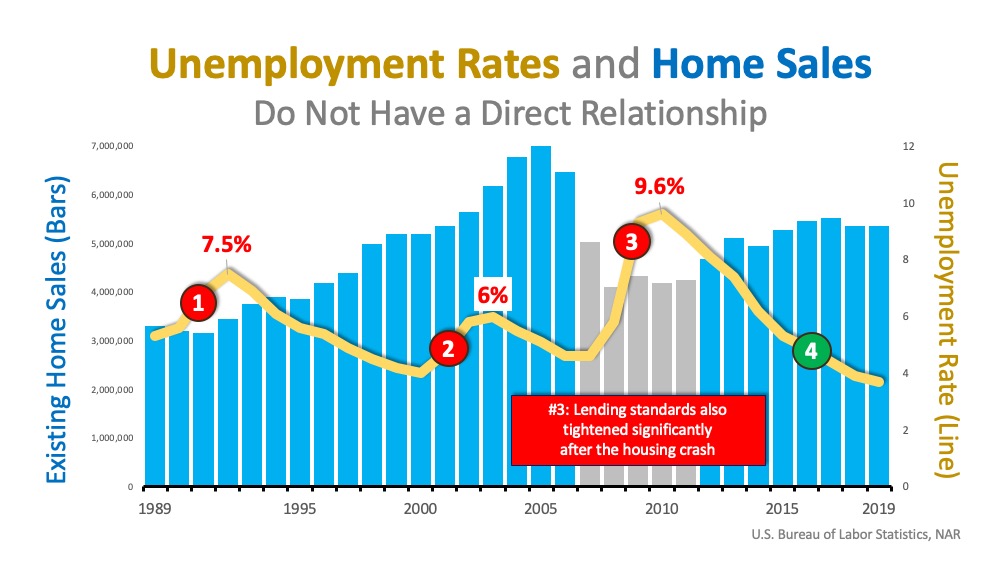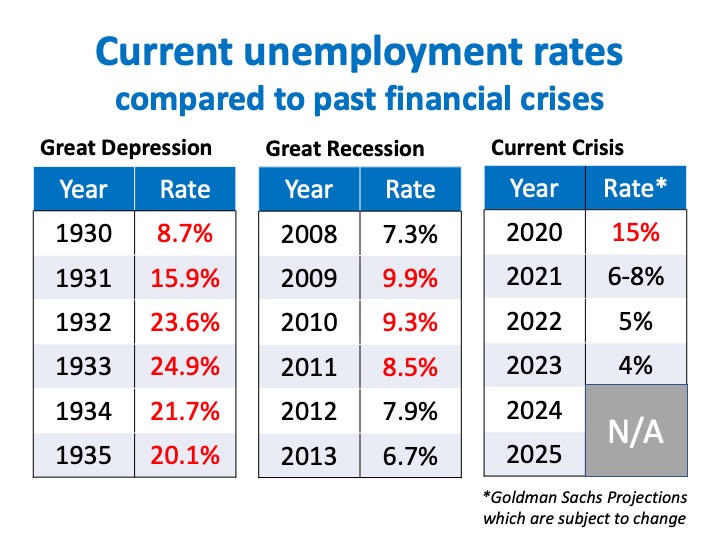We understand that you might be feeling unsure and wary of the stability of the economy during this health crisis and we want to be a voice of reason to you during this time. One of the most pressing questions we are getting right now is how will the housing market be affected by the surge in unemployment?
Over the last couple weeks, ten million Americans lost their jobs. The next announced unemployment rate on May 8th is expected to be in the double digets. Because this health crisis brought the economy to a screeching halt, many are feeling a personal financial crisis and the government is trying to find ways to assist those who have lost their jobs along with companies being forced to close. Keep in mind that this was a planned and organized partial shutdown of the U.S. economy and that the overall goal is to keep households and businesses whole.
How badly will the U.S. economy be damaged if people can’t buy homes?
An understandable concern is that with such a high number of unemployed Americans, how will the residential real estate market stay afloat? Since the housing industry is a major piece of the overall economy, this could put a greater strain on the economy leading to even more job losses.
Chris Herbert, the Managing Director of the Joint Center for Housing Studies of Harvard University, addresses the toll this crisis will have on our nation by explaining:
“Housing is a foundational element of every person’s well being. And with nearly a fifth of US gross domestic product rooted in housing-related expenditures, it is also critical to the well-being of our broader economy.”
How has the unemployment rate in the past affected home sales?
What we found is that unemployment rates and home sales DO NOT have a direct relationship. Yes, there will be an impact, but history has shown that the impact of the unemployment rate on home sales doesn’t seem to be as strong as we may have thought. Take a look at the table below to see what we mean:

- The unemployment rate was rising between 1992-1993, yet home sales increased.
- The unemployment rate was rising between 2001-2003, and home sales increased.
- The unemployment rate was rising between 2007-2010, and home sales significantly decreased.
- The unemployment rate was falling continuously between 2015-2019, and home sales remained relatively flat.
Is this time different?
Yes, there is no doubt that the country hasn’t seen job losses this quickly in almost 100 years. How bad could it get? Goldman Sachs projects the unemployment rate to be 15% in the third quarter of 2020, flattening to single digits by the fourth quarter of this year, and then just over 6% by the fourth quarter of 2021. This is not ideal for the housing industry, but it is manageable.
How does this compare to the other financial crises?
Some believe this is going to be reminiscent of The Great Depression. From the standpoint of unemployment rates alone (the one thing we are addressing in this blog post), it does not compare. See below the unemployment rates during the Great Depression, the Great Recession, and the projected rates moving forward:

There’s a difference between having a spike and dealing with it and having a continuous bleed. Understand that this is a one time event that causes a one time challenge, versus a continuous situation that lasts years.
We hope that was understandable and helped to ease any stress you might be having! This is based on the information we have at the present moment, and we will be sure to continue to post updated content answering the most pressing questions we’re hearing.
Wishing you and your family health and safety during this time!





